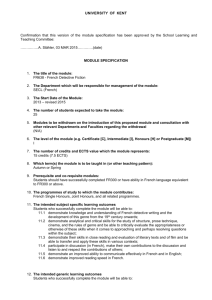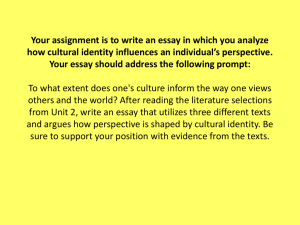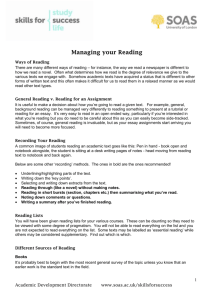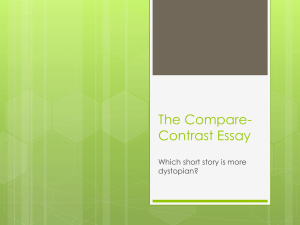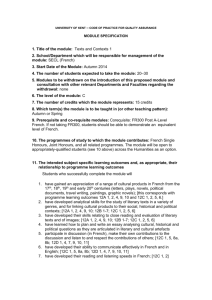University of Kent at Canterbury
advertisement
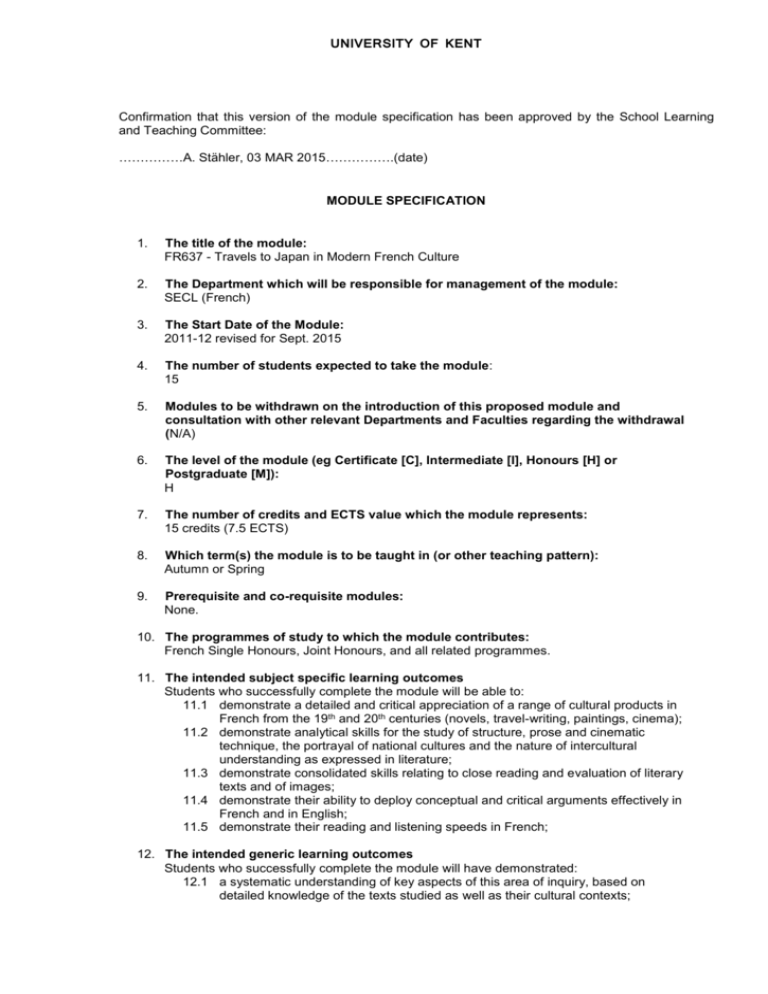
UNIVERSITY OF KENT Confirmation that this version of the module specification has been approved by the School Learning and Teaching Committee: ……………A. Stähler, 03 MAR 2015…………….(date) MODULE SPECIFICATION 1. The title of the module: FR637 - Travels to Japan in Modern French Culture 2. The Department which will be responsible for management of the module: SECL (French) 3. The Start Date of the Module: 2011-12 revised for Sept. 2015 4. The number of students expected to take the module: 15 5. Modules to be withdrawn on the introduction of this proposed module and consultation with other relevant Departments and Faculties regarding the withdrawal (N/A) 6. The level of the module (eg Certificate [C], Intermediate [I], Honours [H] or Postgraduate [M]): H 7. The number of credits and ECTS value which the module represents: 15 credits (7.5 ECTS) 8. Which term(s) the module is to be taught in (or other teaching pattern): Autumn or Spring 9. Prerequisite and co-requisite modules: None. 10. The programmes of study to which the module contributes: French Single Honours, Joint Honours, and all related programmes. 11. The intended subject specific learning outcomes Students who successfully complete the module will be able to: 11.1 demonstrate a detailed and critical appreciation of a range of cultural products in French from the 19th and 20th centuries (novels, travel-writing, paintings, cinema); 11.2 demonstrate analytical skills for the study of structure, prose and cinematic technique, the portrayal of national cultures and the nature of intercultural understanding as expressed in literature; 11.3 demonstrate consolidated skills relating to close reading and evaluation of literary texts and of images; 11.4 demonstrate their ability to deploy conceptual and critical arguments effectively in French and in English; 11.5 demonstrate their reading and listening speeds in French; 12. The intended generic learning outcomes Students who successfully complete the module will have demonstrated: 12.1 a systematic understanding of key aspects of this area of inquiry, based on detailed knowledge of the texts studied as well as their cultural contexts; UNIVERSITY OF KENT 12.2 an ability to effectively and critically analyse cultural products, within the framework of sustained, evidence-based arguments, both in in-class discussion and in written coursework; 12.3 independent research skills, including the undertaking of appropriate research in library collections and online academic databases; 12.4 an ability for self-managed learning in the preparation of coursework including student presentations. 13. A synopsis of the curriculum This course examines the portrayal of Japan in French and Belgian writing and culture from the 19th, 20th and 21st centuries. Since Japan was opened to the West in the mid-19th century, there has been a tradition of French literary japanophilia. The course will permit a critical evaluation of the evolution of French 'japonisme', from its exoticist beginnings in the work of Pierre Loti, through early 20th century theories of exoticism. We will examine the portrayal of contemporary Japan in Amélie Nothomb's and Jacques Roubaud's work. 'Japoniste' images by French Impressionist painters will also be studied, as will Resnais's post-war film Hiroshima mon amour and a cinematic adaptation of Nothomb's work. The study of these texts and images will involve the exploration of themes such as: intercultural understanding (or the lack thereof); the idealisation or demonisation of the other; the nature of ‘Orientalism’; and the way in which French writers and artists turn to the foreign culture in order to critique their own culture. 14. Indicative Reading List Primary texts Dossier of Impressionist and post-Impressionist paintings (any edition) LOTI, P. Madame Chrysanthème RESNAIS, A. Hiroshima mon amour [film] ROUBAUD, J. Tokyo infra-ordinaire NOTHOMB, A. Stupeur et tremblements CORNEAU, A. Stupeur et tremblements [film] 15. Learning and Teaching Methods, including the nature and number of contact hours and the total study hours which will be expected of students, and how these relate to achievement of the intended learning outcomes The module will be taught by means of a weekly lecture (one hour), and a weekly seminar (one hour) for 10 weeks. Total contact hours: 20. Total study hours: 150. Lectures and seminars will normally be conducted mainly in French. Students will be asked to prepare presentations for seminars and to contribute to general discussion. The alternation of small-group and large-group discussion will give students confidence to formulate their own ideas and to share them with a larger group. Time will also be made available for supervision and discussion of essays. These various elements will facilitate students’ achievement of the intended learning outcomes by developing their communication, reading and general knowledge of the French language and French culture, and their independent research skills and analytical skills (subject specific outcomes 1-5; generic learning outcomes 1-4). 16. Assessment methods and how these relate to testing achievement of the intended learning outcomes The final mark for the module will be based on the following elements: If the module runs in the Autumn term: Critical Writing Exercise (500 words): 20% Essay (in English or in French – 2700 words): 60% Oral presentation: 20% If the module runs in the Spring term: UNIVERSITY OF KENT Essay (in English or in French – 2250 words): 40% Oral presentation: 20% Examination (summer term – 2 hours): 40% The essay will be based on reading and analysis of both primary and secondary texts. As preparation for the essay, students will complete a Critical Writing Exercise of 500 words in which they will discuss the way a text expresses particular themes, using correctly referenced filmic and textual evidence to support their argument. (11.2-5; 12.1-4). If the module runs in the Autumn Term feedback on the Critical Writing Exercise will be provided well in advance of the essay deadline. If the module runs in the Spring term, feedback on the essay will be provided in Week 21 well in advance of the exam. Students will also be required to give one oral presentation in French of approximately fifteen minutes. (11.1-5; 12.1-4). If the module runs in the Autumn term the module will be 100% coursework. If the module runs in the Spring term, the examination will take place in the Summer Term. The Exam will satisfy 11.1-4; 12.1-4. 17. Implications for learning resources, including staff, library, IT and space Library resources: a small number of primary texts and supplementary secondary textbooks will be required. These will be ordered well in advance. 18. The School recognises and has embedded the expectations of current disability equality legislation, and supports students with a declared disability or special educational need in its teaching. Within this module we will make reasonable adjustments wherever necessary, including additional or substitute materials, teaching modes or assessment methods for students who have declared and discussed their learning support needs. Arrangements for students with declared disabilities will be made on an individual basis, in consultation with the University’s disability/dyslexia support service, and specialist support will be provided where needed. 19. Campus(es) where module will be delivered: Canterbury

